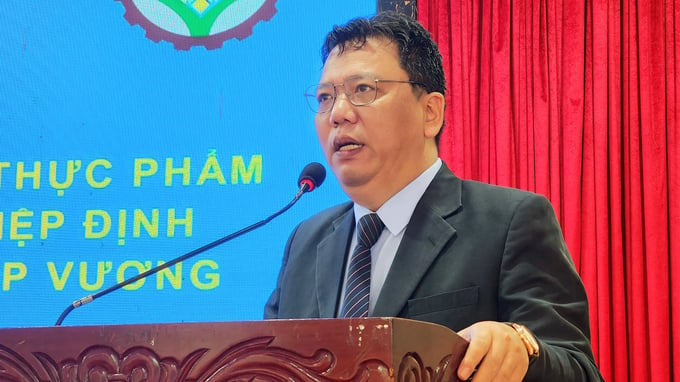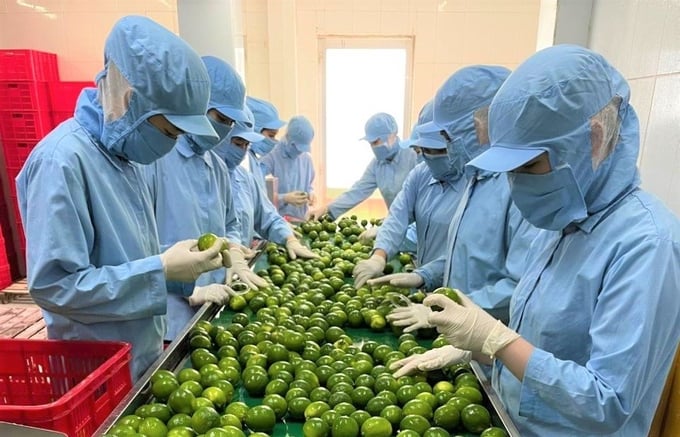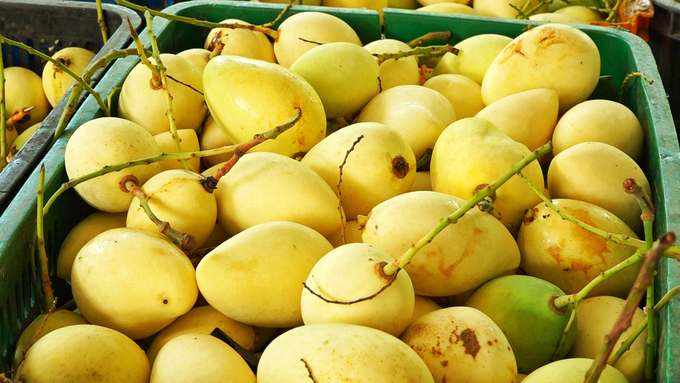May 21, 2025 | 00:44 GMT +7
May 21, 2025 | 00:44 GMT +7
Hotline: 0913.378.918
May 21, 2025 | 00:44 GMT +7
Hotline: 0913.378.918
On November 9, SPS Vietnam organized a Forum to propagate and enforce sanitary and phytosanitary (SPS) measures in the Vietnam - UK Free Trade Agreement (UKVFTA).
The forum aims to provide information about Vietnam's commitments to SPS measures in the UKVFTA Agreement. Answering problems of management agencies, businesses, cooperatives, and farmer households in Ben Tre, Vinh Long, Hau Giang and Can Tho provinces in organizing production, preliminary processing, processing and implementing SPS measures in agricultural trade.

Mr. Ngo Xuan Nam, Deputy Director of SPS Vietnam Office, assessed that disseminating and guiding businesses to adapt to the regulations of the import market quickly is very necessary. Photo: Kim Anh.
According to Mr. Ngo Xuan Nam, Deputy Director of SPS Vietnam, Vietnam has participated in 19 Free Trade Agreements (FTA), of which 16 FTAs have been officially signed. Some FTAs are considered new generation, with many in-depth and comprehensive Sanitary and phytosanitary measures (SPS) in export agricultural production.
Typically, the UKVFTA has commitments to reduce greenhouse gas emissions, or the Regional Comprehensive Economic Partnership (RCEP) Agreement between ASEAN and five countries: Japan, Australia, South Korea, New Zealand, and China, also set out agreements and terms, forcing businesses to adapt.
Therefore, Mr. Nam said it is necessary to disseminate and guide businesses and management agencies at the Center and localities to adapt to market regulations quickly. Currently, SPS Vietnam has 7 technical support units from agencies under the Ministry of Agriculture and Rural Development, the Ministry of Industry and Trade, the Ministry of Health and the Ministry of Science and Technology that will work together to solve specialized problems, improving the quality of export products.

OCOP Biological Fruit Cooperative is building European standard organic lemon certification. Photo: Kim Anh.
Statistics from SPS Vietnam, in the first 8 months of 2023, the total two-way trade turnover between Vietnam and the UK reached US$ 4.62 billion. Vietnam's exports to the UK reached nearly US$ 4.1 billion.
After the UKVFTA took effect, 85.6% of tariff lines were eliminated for Vietnamese goods exported to the UK market. By 2027, this number is expected to increase to 99.2%. In particular, after the UK completes procedures to become the 12th member of the Comprehensive and Progressive Agreement for Trans-Pacific Partnership (CPTPP) in 2024. This predicts that products will Vietnam's great potential, such as: Fragrant rice, tuna, honey... especially agricultural products, vegetables, and food, have increased sharply in this country, thanks to preferential tariffs.

Some fruit products such as pineapple, kiwi, coconut, durian, banana, mango, and passion fruit... do not need a phytosanitary certificate when exported to the UK market. Photo: Kim Anh.
SPS Vietnam assesses that the UK will gradually change SPS measures. Statistics show that in the first 10 months of 2023, this agency updated 1,000 notifications related to measures to change SPS measures for Vietnam's agricultural exports from WTO member countries. Of these, the UK has 23 draft change announcements in 2023.
Mr. Nguyen Quang Hieu, Head of International Cooperation Department, Department of Plant Protection (Ministry of Agriculture and Rural Development), regulations on quarantine for imported goods of plant origin from the UK and Northern Ireland are divided into 6 product groups. Includes: seedlings; fruit; seeds; cut flowers; plant parts and vegetables; tubers including potatoes; all types of machinery and vehicles serving agriculture and forestry.
This country will implement five levels of plant quarantine control. Firstly, it is prohibited goods from abroad entering the UK market must have a license or guarantee.
The second is prohibited and must be risk assessed by the Ministry of Agrarian Policy and Food of Ukraine, after which the local specialized agency will take management measures for each risk.
The third is to be managed and notified. When importing and exporting products, they must be accompanied by a phytosanitary certificate and advance import notification. The exporting country issues this certificate. In Vietnam, export plant quarantine certificates are issued by the Regional Plant Quarantine Branches under the Plant Protection Department. The Mekong Delta region has a Region IX Plant Quarantine Branch responsible for giving this certificate.
Fourth, the level of control is managed. For products in this category, goods must be accompanied by a plant quarantine certificate.
Fifth, the product is not subject to control, which means the product does not require a phytosanitary certificate or prior notification.
In addition, according to phytosanitary regulations, all shipments must meet the basic requirements of not being contaminated with phytosanitary objects of the United Kingdom of Great Britain and Northern Ireland. Besides, there must be an SPS certificate for almost all plant types and living parts, including all seeds for planting.
Particularly for wooden packaging materials, it must meet international standards for wooden packaging materials (ISPM-15). Some fruit items (pineapple, kiwi, coconut, durian, banana, mango, passion fruit...), processed and packaged vegetables (salad, bread, frozen ingredients), and general products (nut butter, nuts containing fruit) do not require an SPS certificate.
Translated by Tuan Huy

(VAN) Dong Thap farmers attained an average profit margin of 64% during the summer-autumn 2024 crop (first season), while An Giang and Kien Giang farmers followed with 56% and 54%, respectively.

(VAN) As a doctoral student doing research on renewable energy and electrification at Harvard University, the author shares his musings on electricity, nature, and countryside memories.

(VAN) The decree on Extended Producer Responsibility (EPR) ensures transparent management and disbursement of support funds, avoiding the creation of a “give-and-take” mechanism.

(VAN) Hue City rigorously enforces regulations regarding marine fishing and resource exploitation, with a particular emphasis on the monitoring of fishing vessels to prevent illegal, unreported, and unregulated (IUU) fishing.

(VAN) Hanoi People's Committee has issued a plan on reducing greenhouse gas emissions in the waste management sector with 2030 vision.

(VAN) Vietnam's draft amendment to Decree No. 156 proposes a mechanism for medicinal herb farming under forest canopies, linking economic development to population retention and the sustainable protection and development of forests.

(VAN) In reality, many craft village models combined with tourism in Son La have proven effective, bringing significant economic benefits to rural communities.